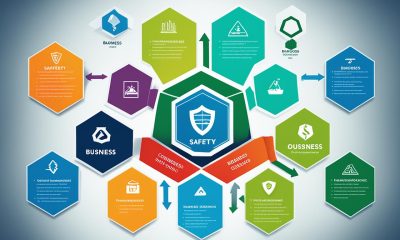Effective Budgeting Strategies for Financial Health
Welcome to our guide on effective budgeting for better financial health. Handling your finances seems tough, but it doesn’t have to be. With the right strategies, you can master your money and set yourself up for a secure future.
We’re going to look at different budgeting methods. These can help you handle your money better. Whether it’s paying off loans, saving for something big, or starting an emergency fund, these tips will guide you.
Let’s dive into budgeting basics and how to spend less. We will give you solid advice and steps to follow. By using these tips in your financial plan, you’ll find long-term stability and improve your financial health.
Key Takeaways:
- Implement budgeting strategies to improve your financial health
- Understand the basics of budgeting for effective money management
- Explore saving money ideas and budgeting tools to optimize your budget
- Embrace frugal living to cultivate a sustainable financial mindset
- Take control of your finances and secure your financial future
Understanding the Basics of Budgeting
Grasping budgeting basics is key for anyone looking to manage their money better. By using sound money management techniques, you can take charge of your finances. This will help you meet your financial goals.
To start, analyze your earnings, spending, and financial aims. Develop a budget that matches your goals. This includes dividing your income for needs such as home expenses, travel, food, paying off debts, saving, and fun activities.
Keeping track of your outgoings is vital in budgeting. This helps you spot where you might be spending too much. You can track this using apps, spreadsheets, or the classic pen and paper. Choose the method that suits you best.
Also, setting achievable financial targets is crucial. Maybe you’re saving for a house, paying off loans, or building an emergency stash. These goals keep you on track and motivated.
Besides, it’s essential to spend wisely. You must know the difference between what you want and what you need. This will guide your spending decisions.
Lastly, planning for surprises is part of financial advice. An emergency fund can cover unexpected costs like medical expenses or car fixes. Saving a little each month prepares you for these surprises.
Key Takeaways:
- Knowing budgeting basics is vital for proper money management.
- Techniques like expense tracking and goal setting can put you in charge of your money.
- The right financial advice teaches you to spend and save wisely, preparing for unexpected costs.
Budgeting Tips
“Budgeting is not about restricting yourself; it’s about making conscious choices that align with your financial goals.”
– Suze Orman
Building good budgeting habits demands discipline but can dramatically change your life. Here are extra tips for effective budgeting:
- Automate your savings: Automatically moving money to savings each month makes saving easier.
- Track your spending: Keeping an eye on your expenses through apps or spreadsheets helps you save more.
- Use cash envelopes: Put specific cash amounts in envelopes for different expenses, like food or fun. This controls your spending.
- Plan your meals: Planning meals saves money by reducing waste and dining out less.
- Shop smarter: Always compare prices, check reviews, and look for deals before buying.
- Review your budget regularly: Check your budget often to ensure it matches your financial goals and adjust as necessary.
| Money Management Techniques | Financial Planning Advice |
|---|---|
| Track your expenses | Set realistic financial goals |
| Make informed financial decisions | Build an emergency fund |
| Prioritize your spending | Prepare for unexpected expenses |
Saving Money Ideas for Smart Budgeting
Finding ways to save money is key for good budgeting. In this section, we’ll look at smart saving tips and tools for your budget. By using these ideas, you can make your budget work better and save more money.
1. Cut Expenses Strategically
Cutting expenses is one of the top ways to save cash. Take a good look at your monthly bills. See where you can choose less expensive options. For instance, talk to your providers for better deals or swap to cheaper services. Saving ideas like eating at home more or dropping unneeded subscriptions can really add up.
2. Develop Smart Spending Habits
Smart spending habits help keep your budget healthy. Before buying something, think: do I really need this? Waiting for sales or comparing prices can ensure you get the best deal. Apps for tracking expenses or budget spreadsheets can show where to cut spending.
3. Utilize Useful Budgeting Tools
Technology makes budget management easier. Use tools for tracking expenses, making a budget, and setting financial goals. Apps like Mint or You Need a Budget give insights on spending. They help you keep financial goals on track.
Integrating these saving tips into your budgeting plan and using tools helps control finances and reach goals.
Remember, budgeting is ongoing. It needs commitment. Review your budget often, adjust as needed, and keep your goals in mind. Being disciplined and using these tips and tools can guide you to financial stability.
Embracing Frugal Living for Long-Term Stability
Frugal living means spending wisely and living within your means. It’s about making smart choices with your money. By being frugal, you save more and prepare for the future.
Here are some tips to help you live frugally:
- Track your expenses: Write down what you spend to find places to save.
- Plan your meals: This cuts food waste, saves money, and means fewer costly eats out.
- Shop smart: Look for deals, use coupons, and choose no-name brands to spend less.
- Reduce energy consumption: Use less power with efficient gadgets and by turning off lights to lower bills.
- Embrace DIY: Doing things yourself saves cash on home fixes, gardening, and beauty routines.
- Entertain at home: Instead of going out, host dinners or game nights to make memories cheaply.
- Second-hand shopping: Thrift stores and online deals are great for clothes and furniture at a bargain.
- Eliminate unnecessary subscriptions: Cut unused services and share streaming accounts to spend less.
- Practice mindful spending: Only buy things that matter to you and truly add value to your life.
- Cultivate contentment: Focus on enjoying what you have and the simple joys of life.
By following these frugal tips, you’re on your way to better financial health. Frugal living means happier living within your budget. It’s about choices that keep you financially stable and content.
Conclusion
Effective budgeting strategies are key to better financial health. By using these methods, you gain control over your money and secure your future. Learning budgeting basics builds a strong foundation for personal finance management.
Adding savings ideas to your plan helps grow your budget and savings. Budgeting tools make managing money easier, keeping you on track towards your goals. Embracing a frugal lifestyle leads to smarter spending and a stable financial future.
Start applying these strategies now. With hard work and discipline, you’ll see your financial health improve. Remember, good budgeting leads to stable finances and well-being. Begin your path to financial freedom and enjoy a secure, prosperous future.
FAQ
What are some effective budgeting strategies?
How can I manage my personal finances effectively?
What are some money management techniques I can use?
How can I start saving money?
What budgeting tools can help me track my progress?
What are some smart spending habits to adopt?
How can frugal living contribute to long-term stability?
-

 Financial Education11 months ago
Financial Education11 months agoEmpowering Your Future with Financial Education
-

 Financial Education11 months ago
Financial Education11 months agoBoost Your Credit Score Improvement Tactics Now
-

 Financial Market11 months ago
Financial Market11 months agoRisk Assessment Strategies for Business Safety
-

 Financial Market11 months ago
Financial Market11 months agoEssential Guide to Economic Indicators 2023
-

 Financial Market11 months ago
Financial Market11 months agoMaximize Wealth with Smart Investment Strategies
-

 Financial Market11 months ago
Financial Market11 months agoSmart Retirement Planning Strategies for You
-

 Credit Cards11 months ago
Credit Cards11 months agoEssential Fraud Protection Strategies for Security
-

 Financial Market11 months ago
Financial Market11 months agoStrategic Asset Allocation Guide for Investors

